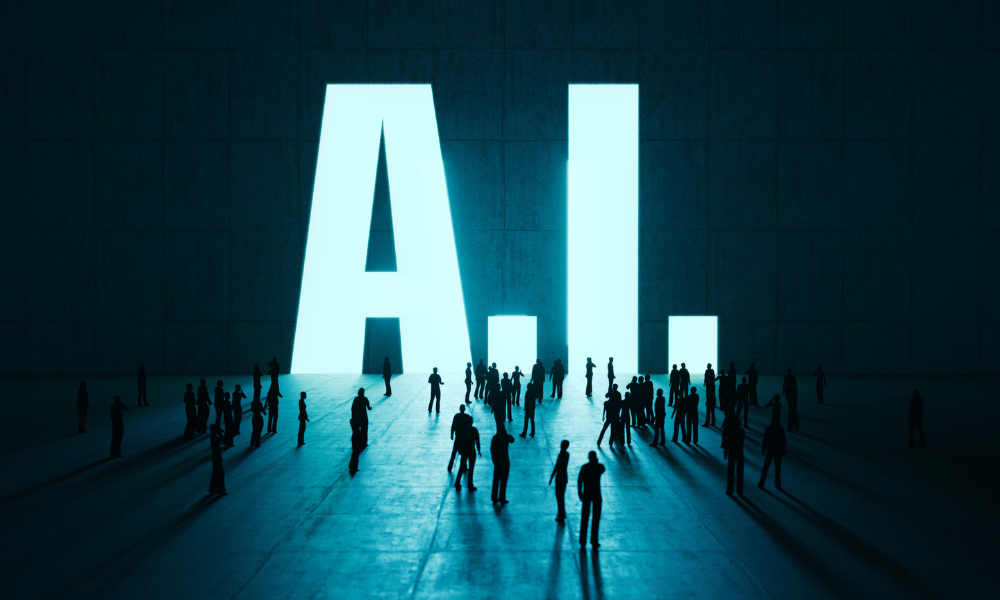
New AI tools could change the legal profession for the good but require proper guardrails

The legal profession is not known for racing to the vanguard of technological innovation, especially when the technology – such as predictive tools that can research and write faster than any lawyer – is seen by some as a sign of their future obsolescence.
In a report earlier this year, Goldman Sachs predicted that generative AI could automate 44 percent of legal tasks in the US.
But as the saying, quickly becoming a cliché, goes: AI will not replace lawyers; lawyers who use AI will replace lawyers who do not.
“At some point, it’s going to be irresponsible not to use it,” says Scott Stevenson, co-founder of Spellbook. His software uses generative AI to help lawyers draft and review documents.
Charles Gluckstein runs a prominent personal injury law firm in Toronto, and he says he uses generative AI in three ways: to summarize medical records, automate project management, and perform legal research. While some of these tools quickly accomplish tasks that would formerly have gone to an articling student, Gluckstein says the technology has not compelled him to shed employees. It has allowed those employees to focus on other tasks and move timelines up.
“My intention was to use the technology to essentially make us more productive,” he says. “Instead of wasting time with the building blocks of an analysis of a project, we can now get to more projects, more often, and get that analysis and those answers done much more quickly.
“We should be turning over the cases more quickly, getting our clients answers more responsibly, and able to handle more volume of projects through the use of technology, so one person eventually will be handling double what they could handle before, in terms of their decision-making power.”
It is important, of course, how this technology is used.
Steven Schwartz, a lawyer in New York City, recently used ChatGPT for legal research and cited several cases the AI had simply made up in a legal brief. Schwartz was representing an airline passenger who had been struck on the knee with a serving cart during a flight. The airline said the limitations period had expired and the court should dismiss the case. Schwartz returned with six cases supporting the position that the plaintiff had filed the lawsuit on time. The defendant could not find them, and the judge concluded they were “bogus.”
Hallucinations are one risk posed by generative AI. Others include lack of nuance and privacy, says Gary Sangha, founder of the legal tech companies Intelligize and LexCheck.
As for the hallucinations, “the whole point of these chatbots is they’re designed to keep the conversation going. They’re not designed to be accurate,” says Sangha. “For legal, where precise language and precise information are important, it’s not optimized. It’s going to make mistakes and errors.”
Generative AI’s lack of nuance poses a problem because legal practice requires empathy, Sangha says. Each client and situation is unique, and a lawyer cannot expect a chatbot to digest a person’s particular circumstances and needs and produce a tailored response.
As for privacy, the information logged into ChatGPT is no longer private. “It goes without saying that anything you throw into OpenAI is now part of their training tool. You’ve got to be very cognizant about that,” says Sangha.
Because of the functionality and efficiency improvement it offers, tech professional Amine Anoun says it’s crucial for lawyers to adopt generative AI. A former data scientist at Uber and an MIT Sloan School of Management graduate, Anoun is the founder and chief technology officer at Evisort, an AI-powered contract management software.

“As long as it’s done with the right data and privacy guidance around it, it can be an accelerator for legal professionals,” he says.
In their new book, The Legal Singularity: How Artificial Intelligence Can Make Law Radically Better, University of Toronto law professors Benjamin Alarie and Abdi Aidid argue that AI can allow the law to live up to its promise. By automating grunt work and administrative chores, AI can make the justice system more equitable, efficient, and publicly accessible. Alarie says this involves dramatically improving the law’s substance and resolution and making it more transparent, certain, and predictable.
“There’s a lot more that we could be doing with the law to support more fairness, more efficiency, fairer institutions, more development, healthier lives, longer lives,” Alarie says. “Virtually everything that we care about, that supports human flourishing, can be supported through improved law.”
Sukesh Kamra, chief knowledge and innovation officer at Torys LLP, told Canadian Lawyer that firms should think about four things before they adopt new legal tech: